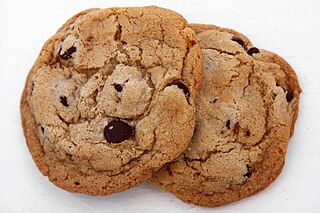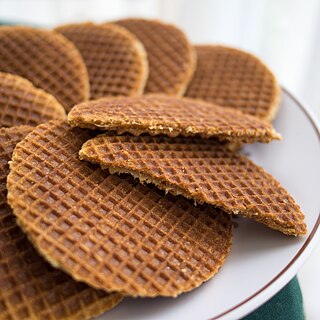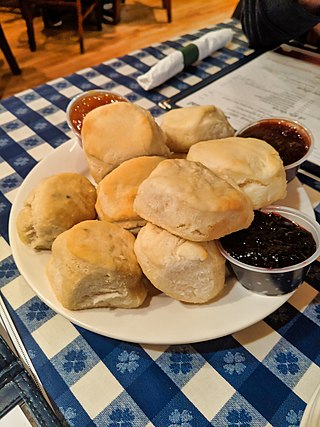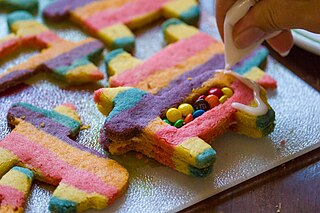A cookie cutter is used to cut cookies into a particular shape.
The term may also refer to:

A cookie, or biscuit, is a baked snack or dessert that is typically small, flat, and sweet. It usually contains flour, sugar, egg, and some type of oil, fat, or butter. It may include other ingredients such as raisins, oats, chocolate chips, or nuts.

A cookie cutter in North American English, also known as a biscuit cutter outside North America, is a tool to cut out cookie/biscuit dough in a particular shape.

Gingerbread refers to a broad category of baked goods, typically flavored with ginger, cloves, nutmeg, and cinnamon and sweetened with honey, sugar, or molasses. Gingerbread foods vary, ranging from a moist loaf cake to forms nearly as crisp as a ginger snap.
Half Moon, Halfmoon, half-moon, or Halve Maen may refer to:
A cookie is a baked or cooked good that is small, flat and sweet.

A stroopwafel is a thin, round waffle cookie made from two layers of sweet baked dough held together by caramel filling. First made in the city of Gouda in South Holland, stroopwafels are a well-known Dutch treat popular throughout the Netherlands and abroad.

A sugar cookie, or sugar biscuit, is a cookie with the main ingredients being sugar, flour, butter, eggs, vanilla, and either baking powder or baking soda. Sugar cookies may be formed by hand, dropped, or rolled and cut into shapes. They may be decorated with additional sugar, icing, sprinkles, or a combination of these. Decorative shapes and figures can be cut into the rolled-out dough using a cookie cutter.

A bear claw is a sweet, yeast-raised pastry, a type of Danish, originating in the United States during the mid-1910s. In Denmark, a bear claw is referred to as a kam. France also has an alternate version of that pastry: patte d'ours, created in 1982 in the Alps. The name bear claw as used for a pastry is first attested in March 1914 by the Geibel German Bakery, located at 915 K Street in downtown Sacramento. The phrase is more common in Western American English, and is included in the U.S. Regional Dialect Survey Results, Question #87, "Do you use the term 'bear claw' for a kind of pastry?"

DHX Cookie Jar Inc. was a Canadian media production, animation studio and distribution company owned by DHX Media. The company was first established in 1976 as CINAR Films Inc., a Montreal-based studio that was heavily involved in children's entertainment. The company's business model, which included the licensing of its properties into educational markets, had a significant impact on its success; by 1999, CINAR held CDN$1.5 billion of the overall children's television market.
Jarvis may refer to:

Christmas cookies or Christmas biscuits are traditionally sugar cookies or biscuits cut into various shapes related to Christmas.

Xenosmilus is an extinct genus of homotherin machairodontine that was discovered in Florida in 2001. It has one species, Xenosmilus hodsonae.
Moravian spice cookies are a traditional kind of cookie that originated in the Colonial American communities of the Moravian Church. The blend of spices and molasses, rolled paper thin, has a reputation as the "World's Thinnest Cookie". They are related to German Lebkuchen; original recipes can be traced back to the 17th century.
Cutter may refer to:

HTTP cookies are small blocks of data created by a web server while a user is browsing a website and placed on the user's computer or other device by the user's web browser. Cookies are placed on the device used to access a website, and more than one cookie may be placed on a user's device during a session.

Cookie decorating dates back to at least the 14th century when in Switzerland, springerle cookie molds were carved from wood and used to impress Biblical designs into cookies.

Phil Steele is an American sportswriter and analyst who focuses exclusively on college and professional football. He is considered a "highly respected prognosticator" within the sports media. His company, Phil Steele Publications, produces the annual preseason magazine Phil Steele's College Football Preview, which he personally writes in almost its entirety. The first edition was published in 1995. In a comparison of the major preseason college football magazines, ESPN writer Pat Forde said:
All the mags have their merits . . . But Phil Steele owns the genre . . . The 46-year-old uses a cookie-cutter layout for every team, and his writing will never be nominated for a Pulitzer. But he does author every two-page team preview himself, and he crams stats, facts and figures into every nook and cranny.

In the United States and Canada, a biscuit is a variety of baked bread with a firm, dry exterior and a soft, crumbly interior. It is made with baking powder as a leavening agent rather than yeast, and at times is called a baking powder biscuit to differentiate it from other types. Like other forms of bread, a biscuit is often served with butter or other condiments, flavored with other ingredients, or combined with other types of food to make sandwiches or other dishes.

Cookie Clicker is a 2013 incremental game created by French programmer Julien "Orteil" Thiennot. The user initially clicks on a big cookie on the screen, earning a single cookie per click. They can then use their earned cookies to purchase assets such as "cursors" and other "buildings" that automatically produce cookies. Upgrades are also available and can improve the efficiency of clicks and buildings, among many other mechanics that allow the user to earn cookies in different ways. The game lacks a conventional ending.

A piñata cookie is a sugar cookie that is shaped and colored like a piñata and filled with various small candies which spill out when the cookie is broken. Piñata cookies may be multicolored, which involves preparing separate batches of cookie dough and dyeing them different colors. The dough is then layered into a loaf with the various colors being separated A cookie cutter may be used to create various shapes. After the cookies are baked, they are further prepared by creating a hollow pocket, inside which the fillings are placed. They may be filled with candies, such as miniature M&Ms candy, chocolate buttons, or other ingredients. They are then sealed using frosting. Piñata cookies are sometimes prepared for Cinco de Mayo. Common ingredients in the dough's preparation include flour, vegetable oil, butter, sugar, powdered sugar, eggs, cream of tartar, vanilla, salt, food coloring and baking soda.